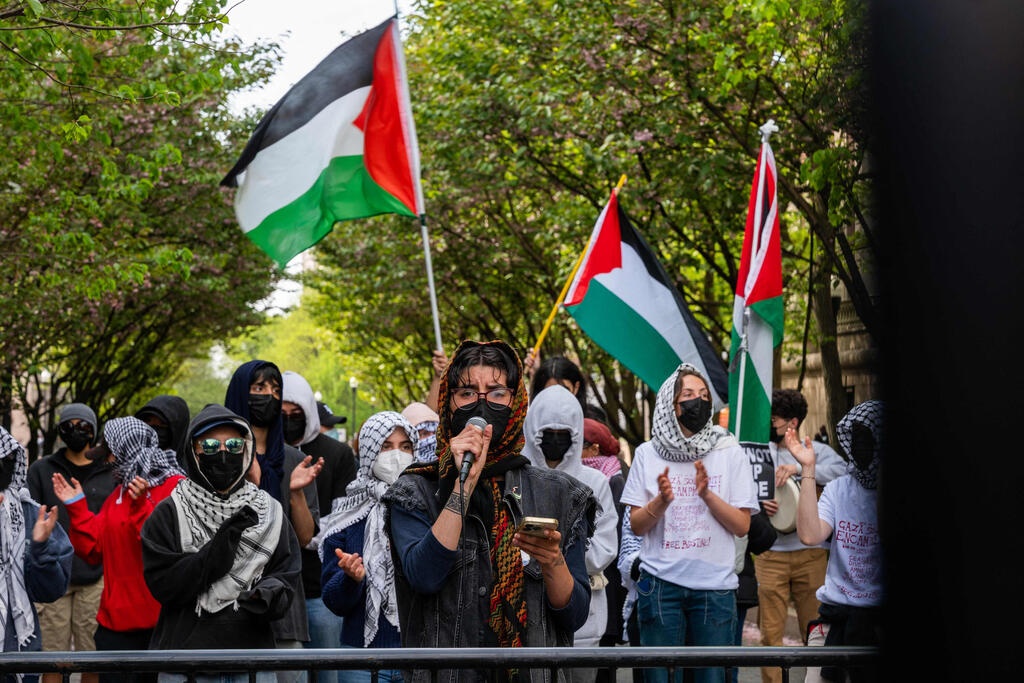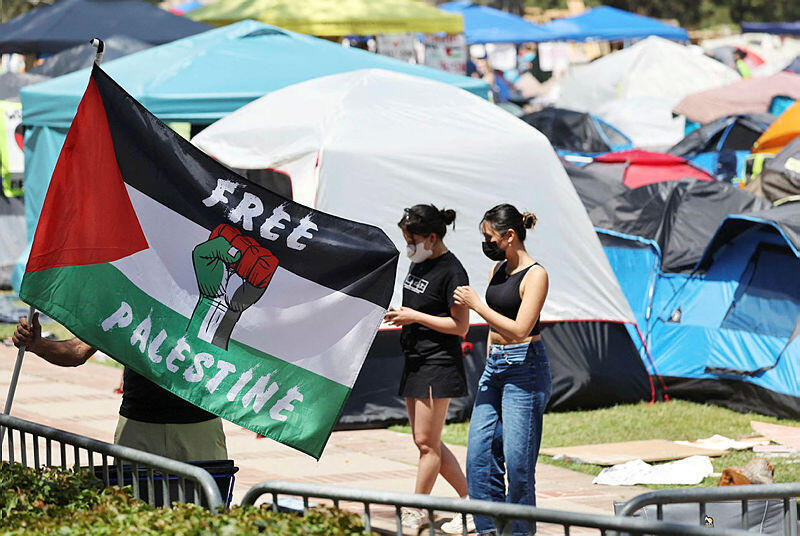Shortly after the October 7 massacre, Prof. Hedy Wald sat in her office, leafing through a stack of medical journals that had piled up on her desk. Her attention caught on one article—not a scientific study, but what she describes as a “political indictment cloaked in academic language.”
This was no isolated incident. Over the following weeks, more articles with sharply anti-Israel rhetoric, and at times even explicit antisemitic undertones, appeared in major medical journals.
4 View gallery


Pro-Palestinian rally in San Francisco
(Photo: Editorial Credit Phil Pasquini shutterstock)
Prof. Wald, an expert in family medicine with extensive training from institutions including Ben-Gurion University, Harvard and currently Brown University in Rhode Island, realized a line had been crossed. Academia, a realm she had always considered a sanctuary for knowledge and objectivity, was turning into a political battleground.
“This cannot continue,” she thought. Initially, she responded with letters to journal editors—some were published, while others were omitted. But the internal pressure continued. These articles, multiplying in frequency, accused Israel of genocide, with some even equating the silence of the medical community with complicity in Nazi crimes. “This is not only misinformation,” she says, “but it actively contributes to creating a hostile environment for Jewish students and researchers in medical faculties.”
As someone who teaches medical ethics and delves into the role of medicine in the Nazi regime, Wald is cautious about drawing Holocaust parallels. Yet, she insists the current climate on medical campuses resonates with “echoes of the Holocaust.”
"I've spoken for over 50 schools on this, to sensitize them to why did go wrong? Why did they start with persecuting doctors and ostracizing them and they all lost their jobs, moving into feeling that they had a moral right to kill the disabled, moving into complicity in genocide of the Jews and persecution of many other groups," she says
We're very cautious with our analogies. So I am not going to tell people it's happening again or we have another Holocaust. The Holocaust cannot be homogenized. It cannot be diluted, and it can't be universalized to the point that it doesn't even exist anymore. What I would say is I like the term 'echoes.' I like the term 'echoes of the Holocaust,' and I feel that there are echoes."
In an effort to counter this troubling trend, Prof. Wald decided to conduct her own investigation. She collected hundreds of cases of antisemitism in U.S. medical fields, compiling data and statistics, including firsthand accounts. Her findings, co-authored with Dr. Steven Roth from the Department of Anesthesiology at the University of Illinois, were recently published in The American Journal of Medicine.
The article documents a dramatic rise in antisemitic incidents at medical schools over the past year, intensifying since October 7. Many of these cases were documented by the newly established American Jewish Medical Association (AJMA), founded after the October 7 massacre to combat antisemitism in healthcare.
Reported incidents include medical students and faculty posting on social media about Jews having "disproportionate power and influence," inflammatory remarks from medical unions or academic panels, antisemitic graffiti and slogans, verbal assaults and demands for students to engage in anti-Israel content that defends terrorism.
"Aspects of anti-Jewish hostile learning environments we have personally observed in medical schools include tearing down posters of Jewish hostages, including children; demonization of Jews, accusing Jewish students of complicity with genocide, wearing banned graduation regalia portraying Israel's destruction, and Holocaust distortion or inversion," They added that since October 7, over 140 civil rights investigations have been opened in the U.S. against universities for fostering hostile learning environments.
Prof. Wald notes she herself hasn’t faced severe incidents like that of an Israeli student at Columbia University, who reportedly sought routine medical care at the campus clinic only to hear staff expressing reluctance to treat her due to her being Jewish.
However, she points to issues closer to home: at Brown University, where she teaches, administrators agreed to allow a vote on October 17 concerning divestment from Israel as part of a compromise to dismantle a pro-Palestinian camp on campus. The motion ultimately failed, with the university’s board choosing to maintain investments in Israel-affiliated companies. Prof. Wald argues that even debating such measures constitutes antisemitism under the guise of anti-Zionism.
Double standard leads to antisemitism
"The IHRA (International Holocaust Remembrance Alliance) definition [of antisemitism], which is accepted by 30 nations, accepted by the United States Department of State, talks about 11 different aspects, delegitimization and double standard among them," Prof. Wald says.
"I go to double standard. If you're going to have a divestment vote, why are you not having a divestment vote on any other world entity that is creating havoc? The Chinese government did not let us in to find out what happened with the source of COVID-19. We have Russia that has gone into Ukraine. We have genocides that are happening in Sudan right now. Why are these not topics for divestment, for encampments, for protests, for panels. That's called a double standard. And double standards and demonization and delegitimization lead us to anti-semitism."
Prof. Wald also sees her colleagues—a delegation of hundreds of doctors who volunteered in Gaza and recently sent a letter to U.S. President Joe Biden demanding an end to military aid to Israel—as part of the problem.
"People can have opinions," she says. "This is about the demonization and the delegitimization, the false narrative here and double standards asking for the medical community to come out with a meaningful stand against Israel. I don't see them calling for a meaningful stand against anybody else, and then it becomes antisemitism, not anti-Zionist.
Where is the line? In her article, she includes the keffiyeh as an antisemitic act. "The keffiyeh has become a controversial symbol, especially when worn during wartime. It’s a symbol of terror, and wearing it at graduation ceremonies is a personal affront to Jewish students and parents. It’s provocative.”
She adds that she is currently working on a new paper documenting protest attire at graduation events, including keffiyehs, Palestinian flags and hand symbols marked in red. "Medical students who claim to stand for law and order have instead broken university rules on graduation regalia, yet graduated with honors. And these are our future doctors. Does that make sense?"
According to Wald, this very sense of morality expected of medical professionals also contributes to the frequency of pro-Palestinian activism in medical schools. "Since COVID, we’ve seen far more medical students engaged in activism, which is largely positive as we fight health inequities and injustices. Some might disagree, but medicine is inherently political; we must ensure care for all without bringing racism, bias, or hate into our work. But when these discussions involve Jews or Israel, it suddenly becomes a propaganda campaign or misguided activism.
4 View gallery


Pro-Palestinian march at Columbia University
(Photo: Spencer Platt / Getty Images North America / AFP)
"So, in the name of so-called 'social justice,' people end up celebrating massacre, rape, and terror as legitimate resistance. I’m horrified to see support for an organization that uses hospitals as terror bases, that denies the Red Cross access to hostages for over a year, and where doctors in Gaza are reportedly holding hostages themselves. It’s beyond belief, yet the support for this starts not just in medical schools. It’s appearing in high schools, with teachers promoting this false narrative, which then flows directly into colleges and health professions.”
'Moral responsibility to combat antisemitism'
The solution, according to Prof. Wald and Dr. Roth, lies in a program they call the "Four E’s" to address antisemitism in healthcare: Education, Engagement, Empathy and Enforcement.
Regarding Education, they argue for acknowledging the moral responsibility of physicians and teaching the history of medicine under the Nazi regime to build empathy and combat antisemitism.
Engagement calls for fostering respectful dialogue in both study and work environments.
Empathy focuses on building personal connections among students, physicians and colleagues.
Enforcement involves establishing clear policies against hate speech and promoting a fair learning environment.
Their approach has already received positive feedback from faculty leaders, but Prof. Wald emphasizes: "This must be coupled with systemic education, including for administrators themselves. If you want a truly equitable Diversity, Equity and Inclusion (DEI) program, it must also address antisemitism and religious discrimination" she says.
"Developing a professional identity that acknowledges history requires that the actions of physicians during the Nazi era and the Holocaust be a mandatory part of medical studies. It’s clear that when Jewish students and faculty report antisemitism, the public is concerned—and they want doctors free of biases against anyone based on skin color, religion, or ethnic background.
"Administrators and medical schools need to wake up. There is a moral duty to confront antisemitism in medicine, because ultimately, we will all need medical care. We need professionals who aren’t bigoted or prejudiced, who fight hate in all forms, and who have a clear moral compass. Without that, there is no fundamental human dignity in medicine.”
Are you optimistic that an academic article can make a difference?
"I have to believe it can. Articles create discussion, and that’s how we bring truth to the forefront. In the end, light will overcome darkness.”
Get the Ynetnews app on your smartphone:





